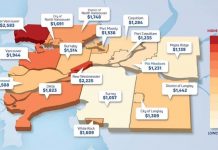WITH municipal elections around the corner, a new study from the rightwing Fraser Institute spotlights and compares government finances in 17 municipalities across Metro Vancouver.
“Municipal governments across the region provide important public services, but their tax and spending policies tend not to receive a whole lot of scrutiny. Our report helps taxpayers and voters better understand the state of their municipality’s finances and how they compare to other municipalities,” said Charles Lammam, the Fraser Institute’s Associate Director of Tax and Fiscal Policy and co-author of Comparing Municipal Government Finances in Metro Vancouver.
The study compares 17 of Metro Vancouver’s 21 municipalities on several categories of fiscal policy (government spending, revenue, and debt) from 2002 to 2012 (the latest year of available data).
For example, among the 17 municipalities, West Vancouver was the highest spender in 2012 at $2,118 per person, followed by New Westminster ($1,837) and Vancouver ($1,689). Surrey, by contrast, was the lowest spender at $951, well below the regional spending average of $1,384 per person.
In other words, Vancouver, the most populated municipality in Metro Vancouver, spends 78 per cent more (per person) than Surrey, the region’s second most populated municipality.
Over the 10-year period, all 17 municipalities increased spending well beyond the rate needed to accommodate for inflation and population growth—a key benchmark for spending growth.
In addition to spending, the study also compares government revenue (including property taxes and other fees) in the 17 municipalities.
Once again, West Vancouver topped the list, collecting $2,548 in revenue per person in 2012, followed by New Westminster ($2,424) and Vancouver ($2,167). Surrey collected the least amount of revenue per person ($1,451) while the regional average was $1,916.
Specifically, on property taxes, a key revenue source, some municipalities rely more heavily on businesses over residents.
For example, Burnaby draws 52 per cent of its property tax revenue from businesses, the highest percentage among the 17 municipalities, compared to the lowest (7.9 per cent) in West Vancouver. Notably, Vancouver, the region’s economic hub, draws a much higher percentage (45.1 per cent) than Surrey (31.3 per cent) and the regional average (40.7 per cent).
“By relying too heavily on businesses for property tax revenue or maintaining uncompetitive tax rates, municipalities risk scaring off entrepreneurs and business people who consider property taxes when making decisions about whether to continue operations, whether to expand, or whether to start a business in the first place,” Lammam said.













